Bathroom Countertops 101: The Top Surface Materials
http://decor-ideas.org 12/20/2014 04:13 Decor Ideas
Choosing the perfect material for one’s bathroom countertops can be a bit of a brain teaser, thanks to the abundant — and quite attractive — options available at nearly every price level. But because bathroom surfaces don’t face the same abuse as those in the kitchen (think hot frying pans, sharp carving knives and spilled Bordeaux), the decisions most buyers wrestle with are usually more about style and cost than Herculean strength. Fortunately, the top bathroom countertop materials on the market combine beauty and brawn in equal measure. Here’s a closer look at some of the most sought-after bathroom surfaces among today’s buyers.
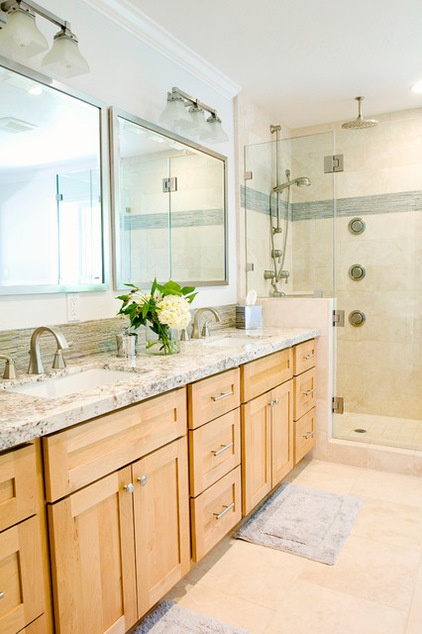
Granite
If your heart is set on granite, count yourself among an enduring majority. Despite encroaching competition from quartz (see below), granite remains the premier choice among the varieties of natural stone, due to its dramatic beauty and seemingly endless variety of colors and patterns.
Pros:
A profusion of options: With patterns from subtle to bold and a rainbow of hues, you’re sure to find a slab that speaks your language.Granite is hard and scratch resistant, and requires minimal upkeep when properly sealed.It’s impervious to humidity or damage from a hot curling iron.It lasts just about forever.Because granite is so desirable, it’s likely to add resale value to your home.
Cons
Granite is still one of the most expensive countertop choices.Because there’s a real chance of damaging the slab if it isn’t handled properly, it’s best to hire a professional to do the job.Though granite is recyclable, its transport and mining require extensive energy resources.
Price range: $50 to $100 per square foot, depending on the size and thickness
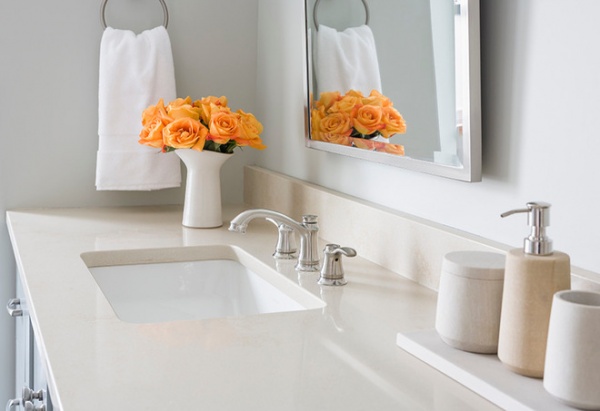
Quartz
Quartz, also known as quartzite, is one of nature’s hardest and most abundant minerals. In fact, nearly every type of stone contains some percentage of this ubiquitous material. Manufacturers of quartz countertops (familiar brand names include Caesarstone, Cambria, Zodiaq and Silestone) add pigments, resins and, occasionally, recycled content, to a base that is approximately 97 percent natural stone.
Pros:
Quartz is tougher than granite and doesn’t require sealing.It’s naturally resistant to moisture, stains and bacteria.It has a variety of edge treatments and installation options
Cons:
Quartz can rival high-end granite and marble in cost.Sharp objects can damage a quartz surface, so watch those nail scissors.Honed and textured finishes will show fingerprints and smudges, so frequent wipe-downs may be necessary.
Price range: $60 to $100 per square foot
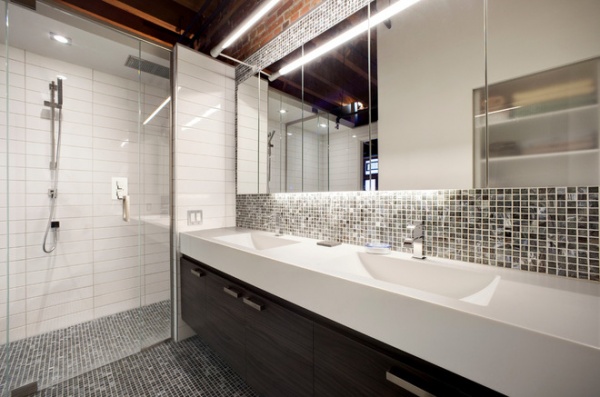
Solid Surface
Solid-surface materials are made of acrylic resin and crushed stone. Top brands include Corian, Gibraltar, Formica Solid Surfacing and Staron. You’ll find a wide range of solid colors and subtle patterns that pair especially well with contemporary decor.
Pros:Extremely durable and naturally resistant to water, bacteria and stains.Realistic flecked or streaked styles can rival natural stone. Virtually seamless.Minor damage can be buffed out.Available with integral sink and backsplash options, as well as custom color inlays and lighting effects.
Cons:
Requires professional installation.Wear and scratches are more visible on darker colors.Can be damaged by intense heat or dropped objects.
Price range: $40 to $100 per linear foot
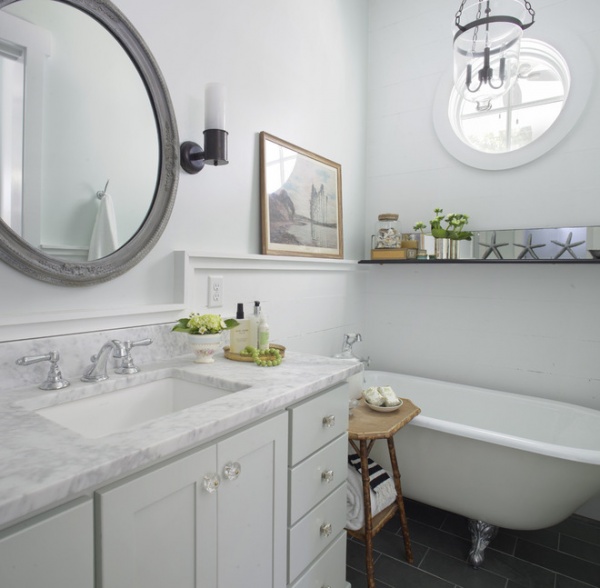
Marble
For centuries marble’s cool elegance has been synonymous with wealth and privilege. But thanks to improvements in its production, this rare beauty has become a bit more affordable. A hard, crystalline form of limestone, marble is often white with streaks of grays, although there are many color variations.
Pros:
Long lasting and strong enough to resist most chips or dents.Can be polished for a high shine or honed for a casual, matte finish.Adaptable to nearly every style.
Cons:
It’s expensive.Marble’s porous nature makes it prone to stains, scratches and etching from acidic substances.Requires periodic sealing to maintain the finish.Price range: $125 to $150 per square foot, depending on thickness and installation
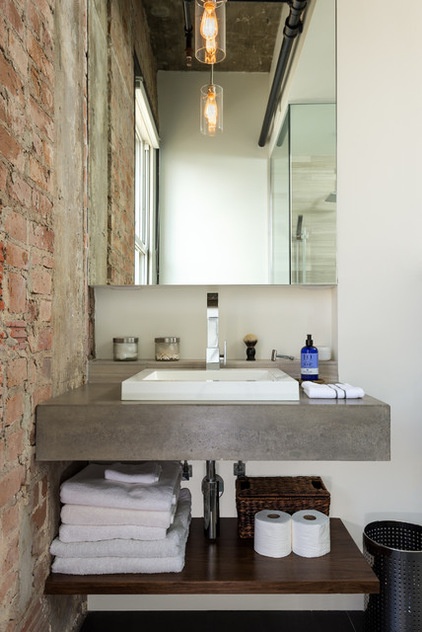
Concrete
No longer exclusively an industrial material, concrete has miraculous shape-shifting abilities that allow an endless array of looks. Most concrete countertops are manufactured offsite for maximum quality control.
Pros:
It’s an appealing organic material that can mimic the look of natural stone.Vast range of customized colors, textures and decorative inlays.Can be cast in the exact shape, dimensions and edge style desired.Extremely durable.Reasonably ecofriendly, especially when recycled content is added.
Cons:
Professional design and installation are recommended.Because concrete is naturally porous, countertops need to be waxed and sealed regularly.Visible seam lines, although their appearance can be minimized with a colored filler.
Price range: $65 to $135 per square foot, not including installation
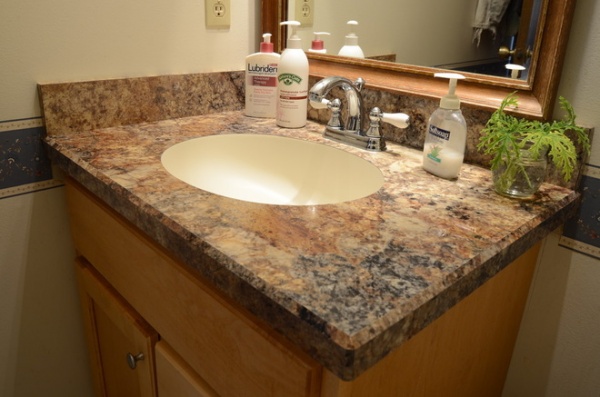
Laminate
Laminate has come a long way since the garish pastels and visible seams many of us remember from the ’60s and ’70s. Most commonly known as Formica, this easy-care product is composed of a thin plastic surface that’s pressure bonded to a particleboard or plywood base. The latest printing technologies are used for modern laminates to produce amazingly realistic stone- and wood-like finishes, as well as a plethora of solid and graphic patterns.
Pros:
One of the most affordable countertop surfaces.Durable, water resistant and easy to clean.Warm to the touch.Presized products are widely available at home supply stores.Relatively easy to install without a professional.
Cons:
Laminate tends to thin or dull over time.Damages can’t be repaired; the entire counter usually needs to be replaced.
Price range: $24 to $50 per linear foot
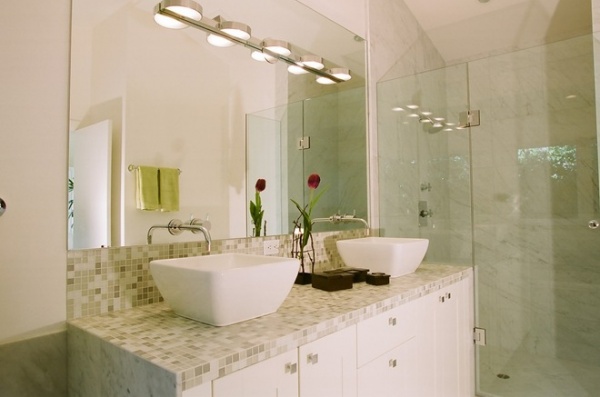
Tile
Ceramic tile can be a charming and informal surface material, especially in a Spanish colonial– or beach cottage–style bath. Boldly patterned tiles also make wonderful backsplashes and tub surrounds.
Pros:
Glazed ceramic tiles are resistant to heat, stains, scratches and moisture. Tile is affordable, and individual tiles can be replaced if damaged.The installation and pattern can be customized.
Cons:
Grout can attract stains and mildew and may be difficult to keep clean.Tiles can crack or chip.
Price range: $65 to $135 per square foot, not including labor
More:
Bathroom Workbook: How Much Does a Bathroom Remodel Cost?
Key Measurements to Make the Most of Your Bathroom
Kitchen Countertops 101: Choosing a Surface Material
Related Articles Recommended












